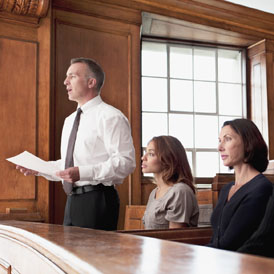Q and A: Contempt of court in the internet age
A top barrister tells Channel 4 News that courts have to trust jurors to follow the rules, despite the temptations of technology.

Max Hill QC, a leading criminal barrister and vice-chairman of the Criminal Bar Association, spoke to Channel 4 News about the implications of the “Facebook juror”.
Joanne Fraill, 40, a jury member in a Manchester drugs trial, faces up to two years in prison after being convicted of contempt of court for contacting a defendant on Facebook while the trial was in progress.
The defendant Jamie Sewart, 34, was cleared of wrongdoing in the drugs trial but also found guilty of contempt of court. Ms Sewart has been told she will not go to jail but will face a suspended sentence.
Is it unusual for someone to be jailed when they haven’t been found guilty by a jury?
It is, but what the law provides is a mechanism where the Attorney General brings proceedings in the High Court because of the particular type of conduct, and it’s an opportunity for the court and the Lord Chief Justice to set guidelines or say things for general consumption.
Are jurors specifically warned about the dangers of the internet?
It has been the case for several years that judges give specific warnings to every juror about using the internet when they are serving on a jury. The standard directions provided to all Crown Court judges have been ramped up to include specific warnings mentioning MySpace and Facebook by name.
Nobody wants to see ordinary members of the public, who are doing their duty by giving up their normal life for weeks or months, get on the wrong side of the law.
So quite apart from common sense, every juror knows that there are things they must not do.
How common are cases like this?
Clearly, there are far more examples of defendants who seek to break the rules and make inappropriate approaches to jurors.
It’s a very rare case when it is the juror who of their own volition breaks the rules.
It can be very expensive when they do. Criminal lawyers are already working harder for less money, and we are working very hard to reduce the overall expenses of the system through increased efficiency, so incidents like this are not helpful.
It’s in everyone’s interests to play by the rules.
Why not just lock juries away in a hotel for the duration of the trial without access to the internet or media, like they do in other countries?
It is very, very expensive and very, very difficult in practice. There was a famous case about 20 years ago when a jury sequestered in a hotel used a ouija board to contact a murder victim and ask him who killed him.
Now we have Twitter, Facebook, iPhones, iPads – it’s very difficult, if not impossible, to take all these devices away from people. A better course and, in fact, a cheaper course, is to give the jury strict instructions and then trust them. And that’s what we want to do.
Seances, champagne and headphones – when jurors find themselves in the dock
In 1992, Judge George Shindler halted a trial at Inner London Crown Court after a juror passed him a note asking: “When is it dinner time?” The court heard that the man, in his 30s, had upset other members of the jury with his lunchtime drinking and bad language during the murder trial. Judge Shindler ordered the panel to be discharged, telling the juror: “You are lucky I do not deal with this as a contempt of court.”
In 1994 insurance Stephen Young was granted a retrial after it emerged that a jury at Hove Crown Court had conducted a seance with a ouija board while staying overnight at a hotel. Young was convicted for a second time and jailed for life for the murder of newlyweds Harry and Nicola Fuller.
In 2004 the Court of Appeal was forced to reconsider the convictions of three fraudsters after the jury forewoman sent an amorous note to the prosecuting barrister. The woman sent a bottle of champagne to Richard Latham QC along with the message: “What does a lady need to do to attract your attention?” The married lawyer returned the gift and defence barristers called for a retrial, arguing that the woman’s actions showed she may have been biased in favour of the prosecution. But the Court of Appeal spared her the embarrassment of being cross-examined in court when they upheld the principle that jury deliberations must remain secret.
In 2007 a Muslim woman serving on a Jury at London’s Blackfriars Crown Court was arrested on suspicion of contempt of court after being accused of listening to an MP3 player under her headscarf during a murder trial. Judge Roger Chapple said he discharged the 20-year-old because of a complaint from another juror, and added: “I thought I heard the characteristic tinny sound of music from headphones fleetingly.” The 20-year-old denied she had been listening to music and the Attorney General decided there was insufficient evidence to prove contempt of court.